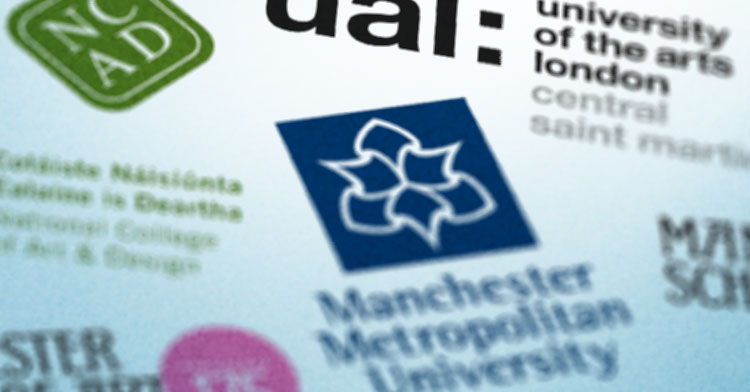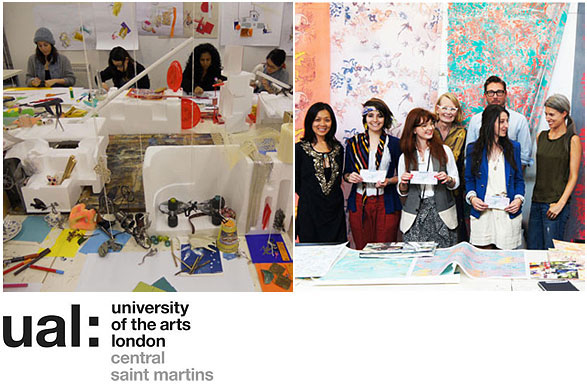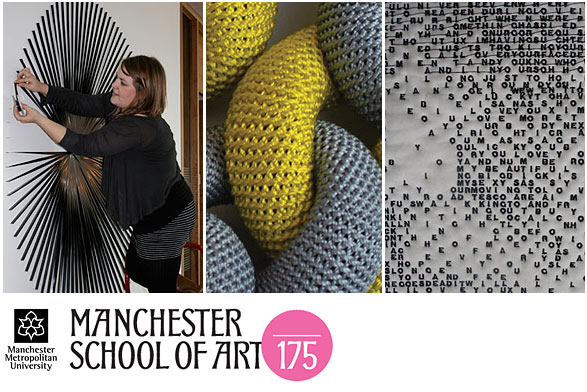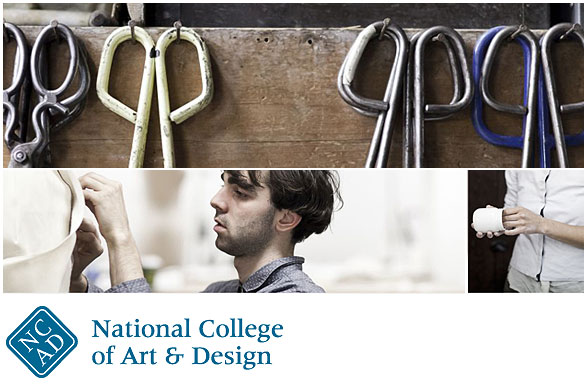3 of the best textile art degree courses

If you’re looking to develop a career in textiles and would like to undergo some related training, it helps to know early on which courses are worth considering. We’ll be showcasing some of the options over the coming months and decided to start by introducing three of the best textile artist degree courses in the UK and Ireland.
Central St Martins – BA (Honours) Textile Design
Overview
Central St Martins College of Arts and Design in London has a long and proven record. Internationally renowned as an art college and cultural centre in one, it is famous for the creative energy of its students, staff and graduates. It has long held a reputation for providing one of the top textile art degrees in the UK.
The BA (Honours) Textile Design course at Central St Martins is based around exploring print, knit and weave, the three essential textile design practices. There is also a strong focus on non-traditional methods including digital design, as well as presentation and trend prediction. The course offers a wide range of complementary workshops investigating alternative surface treatments, media and technologies. St Martins aims to maximise the student’s creative and intellectual potential, enabling them to develop a unique design philosophy and challenge conventions.
Course Outline
BA Textile Design is a full-time undergraduate course (based in London) and runs for 90 weeks over three years. It has three specialist pathways – Knit, Print and Weave. Whichever pathway is chosen, there’s a strong focus on the development of the students as individuals. Students are expected to take initiative and nurture their own ideas leading to increasing independence as the course progresses, meaning there is no ‘right way’ to be successful.
Main study – Stage One: Stage One is an introductory stage and concentrates on all three areas of specialization; print, weave and knit. There is also a focus on enabling students to carry out visual research. During Stage One (three terms) students move from introductory design workshops through to a succession of structured and guided projects. The aim of the projects is to explore the ideas of research, drawing, colour, design and technical skills. There are also opportunities to develop techniques in digital and non-traditional approaches to design, structure and surface.
Main study – Stage Two: During this stage, students undertake thorough research, which should enable them to apply the skills and knowledge gained in Stage One and embrace the challenges of transforming ideas into pieces of textile work. In the second term, students begin to focus more specifically on knit, print or weave. Each of the three specialisms has unique characteristics and requirements with regards to their subject knowledge. Stage Two of the course also involves extending professional and contextual knowledge of textile design for fashion, accessories, interior, exterior and product applications and students will learn about market research, range building and promotional presentation.
Main study – Stage Three: The final year of the Textile Design BA encourages students to assess and address their strengths and weaknesses prior to beginning their final degree project. The heavily structured nature of the first two years is replaced increasingly by a self-disciplined approach towards the realisation of a major project. However, guidance and advice are always readily available. This is also the time that students develop a strong portfolio and collection, which count towards the degree examination and public show.
Careers
Graduates pursue a range of careers, often becoming designers, designer-makers, researchers, buyers, stylists and illustrators. Some work in concept and trend forecasting, others in theatre or journalism. Many students go on to postgraduate study.
For more information, entry requirements or to get a prospectus visit the St Martins website.
Manchester Metropolitan University – BA (Honours) Textiles in Practice
Overview
Manchester School of Art (at Manchester Met) is one of the largest providers of art and design education in the UK. The school offers an extensive range of resources and works in close conjunction with various well-respected external organisations.
The BA (Honours) Textiles in Practice programme at the Manchester Met is structured around an understanding of professional contexts, including fashion, interiors, exhibition and architectural installation. The aim is to allow students to approach textiles as a flexible and varied medium; specialist study is available in print, knit, weave, and embroidery.
There is a unique philosophy at the Manchester Met that encourages the interdisciplinary nature of contemporary practice. This opens up opportunities for processes and techniques to combine and complement one another. A wonderful bonus with this particular course is that all teaching staff are currently practicing as textile practitioners and researchers.
Faculty members including Alice Kettle and Jane McKeating who recently published the book Hand Stitch Perspectives featured in the TextileArtist.org article Top five textile artist books.
Course Outline
In Year 1 students concentrate on broadening their understanding of textile contexts. The training covers visual research, technical tools and a multitude of skills, required to complete the remainder of the course. The aim of the faculty is to open the minds of students and introduce them to a new way of thinking creatively.
Much like St Martins, Year 2 allows students to determine a specialist pathway through the programme, concentrating more fully on one area of practice. From there, the teaching focuses on developing the individual skills necessary to articulate ideas. Opportunities will be available to collaborate with external partners (including studios, manufacturers and galleries) and work with other students and staff from across the faculty.
In Year 3 the focus shifts once again to creating a professional portfolio of work that highlights individual practice. Students are encouraged to deepen their understanding of the context of their work, and create products and artifacts that reflect their area of specialisation.
Careers
Astoundingly, having completed a textile art degree at the Manchester School of Art, 93% of fashion and textiles graduates undertake employment or further study immediately after leaving. Employment opportunities span a wide range of sectors in the industry from independent design houses to high street chains. Previous graduates have gone on to enjoy careers with companies such as River Island, Next, Dolce & Gabbana, Top Shop, Abercrombie and Fitch, Reebok and ASOS, among others.
For more information, entry requirements or to get a prospectus visit the Manchester Metropolitan website.
The National College of Art and Design (Ireland) – Textile Art & Artefact (BA Honours)
Overview
The National College of Art and Design holds a unique position in art and design education in Ireland; it boasts the largest range of art and design degrees in the state at undergraduate and postgraduate level.
The BA Honours course in Textile Art and Artefact at NCAD is based around empowering students to design from a fundamental response to materials and ‘making’ in its broadest sense. Students will develop an awareness and knowledge of a wide variety of both digital and hand crafted textile processes, as well as their social and cultural context.
The NCAD textile faculty takes a holistic approach when bringing together the 3 strands of drawing, materials and context. Students will embrace visual research as a means to making images, textures, surfaces and producing objects. It is essential that traditional textile and surface design techniques are honoured, but that students are willing to delve deeper, embracing an interdisciplinary approach which includes the use of film, photography, graphic design, performance and exhibitions.
Staff members include TextileArtist.org interviewees Nigel Cheney and Helen McAllister.
Course Outline
Year 1: The First Year consists of three 10 week periods. The first term is a multi-disciplinary experience across art and design. The second term focuses on design and allows the student to get to grips with a range of design disciplines. They will also be expected to begin to develop creative, technical and thinking skills. The final term’s tutoring will focus on a specific aspect of design, as chosen by the student; the aim of this is to provide a solid foundation for the next two years of study.
Year 2: The Second Year centres around the evolution of a personal visual language, providing students with the skills and techniques necessary to translate this into original Textile Art and Artefact practice. Students are also encouraged to research and define a specific audience and develop a market understanding through professional practice.
Year 3: In the Third Year the focus shifts to students creating their own programme of study, which will be reflective of the individual’s area of expertise. The final year culminates in producing a substantial body of work for assessment and display at degree shows, exhibitions and events.
At this point, there is the opportunity for students who reach the appropriate standard to stay on for a further two years of postgraduate study and leave with an MA in Textile Art & Artefact.
Careers
As a result of the range of skills acquired, Textiles graduates are faced with an array of local and global opportunities. Previous graduates have gone on to become successful visual artists, entrepreneurs, fashion and textile designers for couture, milliners, accessory designers, stylists, costume and prop designers for all types of performance, illustrators and art therapists. There is a growing trend for graduates to progress to further study at Post Graduate level to refine their creative understanding and ability.
For more information, entry requirements or to get a prospectus visit the National College of Art and Design website.
If you’ve found this information about degrees for textile artists useful then let us know by leaving a comment below.



















hi, i am applying for textile design this year and i wondered when this article was written?
Hi Jess – this article is based on the recommendations of textile artist Sue Stone and was written in October 2013. Thanks for getting in touch.
Hi Joe,
I’m interested in what courses are around in Australia, if you even happen to come across some good info.
Love the resources you’re creating here.
The Australian National University in Canberra has an excellent textile course run by Valerie Kirk, an international textile artist in her own right.
I would wholeheartedly recommend having been Artist in Residence there in 2012.
Hi there,
thank you for the info,
i’m looking to study in textile design in France, any idea
which colleges are the best there?
thank you.
What about distance/correspondence courses? Any that you would recommend?
Distant Stitch looks good. I haven’t tried it but am considering it for the City and Guilds.
http://www.distantstitch.co.uk/
Hi Frankie, I’m currently studying Distant Stitch’s Certificate course, on module 5 of 6 and I can’t recommend it too highly. A closed Facebook group and an annual summer school helps us keep in touch with each other. The content leads us through the design process and introduces relevant embroidery skills as they suit the design. The feedback is excellent – encouraging, but gently pushing us to go that bit further and to develop our own style.
You can study textiles with the OCA as a distance learner.
Can u recommend which are the best universities for textile design in usa
i’d love to know if you recommend any in the usa.
Hi there,
Within London which textile course(s) (university or not) would you recommend other than the one at St Martin?
Thank you
Alex
Hi Alex, other than St Martins the courses that have been recommended to us are:
RCA – http://www.rca.ac.uk/schools/school-of-material/textiles/
Farnham (not too far from London) – http://www.ucreative.ac.uk/courses
City Lit – http://www.citylit.ac.uk/courses/art-%26-design/fashion-%26-textiles
And although not specifically in London, OCA courses are also a great option – http://www.oca.ac.uk/creative-arts-degrees/ba-hons-textiles/
Finally, these are more for embroidery but both are excellent:
Hand & Lock – http://www.handembroidery.com/?gclid=CJGE29j4t8cCFeQSwwodMx8PaA
Royal School of Needlework – http://www.royal-needlework.org.uk/content/2/royal_school_of_needlework_hand_embroidery_classes_for_beginners_and_experts
hi there,
I am planning to apply for the MA course of Textiles in Brighton..
Any comments on that? what about the career field after that?
Hi, I’m applying for this course now. Have you already started? Did you get any feedback from your question? Do you have any feedback to offer?
I live in Canada and there appear to be very few textiles related post secondary programs. I am currently enrolled in the OCA BA(Hons) Textile program. I am learning a great deal, although I find being out here “on my own” very challenging. I try to remain connected via FB, Skype and whatever local textile connections I can cultivate…
Hello Connie Kadey,
I am a Textils tutor and designer, Can you please connect with me so we could collaborate so you can also learn about African Textiles from me?
Thanks.
Lucky, Ghana.
I read this post fully about the comparison of most up-to-date and preceding technologies, it’s
remarkable article.
Hi
I’m looking to study intextile print in Canada, do you have any idea which colleges are the best?
Its like yyou read mmy mind! You appear to know so much abolut this, like yyou rote the book in it or something.
I think that you can do with ssome pics to drive the message
home a bit, but instead of that, this is fantastic blog.
An exccellent read. I will definitely be back.
I would recommend students looking for courses in the uk go to New Designers in London held every year at the end of June to see the variety and breadth of courses available to them in this area – there are many choices and options to consider. Most universities exhibit at this event including some from other countries now so well worth a visit.
hello! very interesting article. Currently I am studing printmaking in Costa Rica and I am persuing a Master in the UK for textiles (I am more interested in printed and surface design than knit or weaving). Would these universities would be good to do for a Master too? Or are there any other options?
Hi am in Tanzania current persuing the bacherol degree in textile design and technolody, I would like to do a MA in textile artsarts and most especially on weaving, I want to get to know all about weaving techniques and how to go about them machinerywise ..please I need someone to guide me based on what I have said, so I can know which course is suitable for me, I would like to study in UK
I have just started a level 3 Hand Embroidery course city and guilds, though school of stitched textiles. Seems like the only place offering city and guilds textile courses. Seems well organized and appropriately challenging, I’m enjoying it and being part of a wider group of textile ‘artists’.
Weaving/Textile art workshop
Good day
Í am interested in attending international Weaving training this year.
My university is ready to sponsor me to international workshop based on the following conditions.
1.the workshop /training must be organised by university .
2.the programme must be 3-5 days and be on university website.
3. the workshop registration fees must be not more than $500.
4.Also, it must be done anytime from November
Hi,
That’a a perfect blog on the textile design courses options. Really its what is required by the aspiring candidates for Textile Degree Courses.
I am a Ghanaian Textiles Techonolgy Tutor and Textiles designer with 13 years teaching experience in the Ghana Education Service, Ministry of Education.
I wish to apply for a temporary appointment as a visiting tutor in any of the Textiles institution in UK to enable me help UK students have an insight into African Textiles.
Anybody with direction and advise should not hesitate to help me achieve this aim.
Thank you.
Hy.i am looking to study textile designe in Pakistan so can you please recommend which are the best universities for textile in Pakistan?